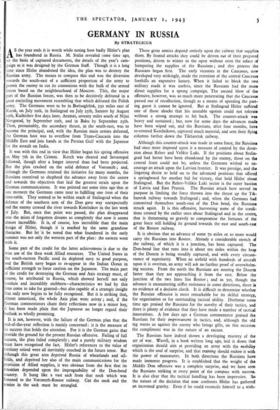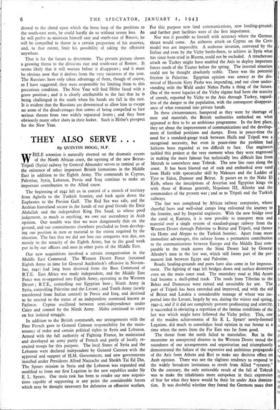GERMANY IN RUSSIA
By STRATEC;ICUS
AS the year ends it is worth while noting how badly Hitler's plan has foundered in Russia. M. Stalin revealed come time ago, on the basis of captured documents, the details of the year's cam
paign as it was designed by the German Staff. Though it is a long time since Hitler abandoned the idea, the plan was to destroy the Russian army. The means to compass this end was the diversion towards the south-east of a sufficient proportion of the army to permit the enemy to cut its connexions with the bulk of the armed forces based on the neighbourhood of Moscow. This, the major part of the Russian forces, was then to be decisively defeated in a great encircling movement resembling that which defeated the Polish army. The Germans were to be in Borisoglebsk, 250 miles east of Kursk, on July loth, in Stalingrad on July 25th, Saratov by August loth, Kuibishev five days later, Aramas, seventy miles south of Nijni Novgorod, by September loth, and in Baku by September 25th.
Then, presumably, the secondary thrust, in the south-east, was to become the principal, and, with the Russian main armies defeated, the German host was to overflow from Trans-Caucasia into the Middle East and join hands at the Persian Gulf with the Japanese for the assault on India.
It was with this end in view that Hitler began his spring offensive on May 7th in the Crimea. Kerch was deared and Sevastopol followed, though after a longer interval than had been projected.
But the plan crashed on the solid defence of Voronezh ; and, although the Germans retained the initiative for many months, the Russians contrived to shepherd the advance away from the centre and towards the objectives that laid the greatest strain upon the German communications. It was pointed out some time ago that at one moment the Germans came near to fulfilling one item of their time-table. They seemed to be within reach of Stalingrad when the defence of the southern arm of the Don gave way unexpectedly and the enemy crossed the river towards Kotelnikov in the last week of July. But, once that point was passed, the plan disappeared into the mists of forgotten dreams so completely that now it seems almost incredible. It is, of course, less incredible than the main design of Hitler, though it is marked by the same grandiose character. But let ' it be noted that what foundered in the early summer was not only the western part of the plan: the eastern went with it.
Some part of the credit for the latter achievement is due to the wise use of the then weak Allied resources. The United States in the south-eastern Pacific used its depleted navy to good purpose, and the British navy began to re-appear in the Indian Ocean in sufficient strength to force caution on the Japanese. The main part of the credit for destroying the German and Axis strategy must, of course, be attributed to Russia, which showed herself not only resolute and incredibly stubborn—characteristics we had by this time come to take for granted—but also capable of a strategic insight that only now begins to be fully recognised. But it is striking that, almost unnoticed, the whole Axis plan went astray ; and, if the German commentators chant their reflections now in a minor key, it has been made plain that the Japanese no longer regard their outlook as wholly promising.
It is not, however, with the failure of the German plan that the end-of-the-year reflection is mainly concerned: it is the measure of its success that holds the attention. For it is the German gains that provide the ground for the present Russian offensive. Failing of full success, the plan failed completely ; and a purely military wisdom must have recognised the fact. Hitler's references to the value of territory seized were all inevitably couched in the future tense. But although this great area deprived Russia of wheatlands and oilfields, and deprived her also of the main communications for the provision of Allied supplies, it was obvious from the first that its retention depended upon the impregnability of the Don-bend country. It 'hung like a vast sack from that neck which was fastened to the Voronezh-Rostov railway. Cut the neck and the armies in the sack must be strangled. These great armies depend entirely upon the railway that supplies them. By frontal attacks they could be driven out of their prepared positions, driven to winter in the open without even the solace of hampering the supplies of the Russians ; and this process the Russians began first. The early victories in the Caucasus, now developed very strikingly, made the retention of the central Caucasus foothills an expensive luxury. When it failed to block the two military roads it was useless, since the Russians had the more direct supplies for a spring campaign. The second blow of the offensive, however, was so much more penetrating that the Caucasus passed out of recollection, though as a means of speeding the parting guest it cannot be ignored. But at Stalingrad Hitler suffered one of those shocks that his unstable egoism could not tolerate without a strong attempt to hit back. The counter-attack was heavy and sustained ; but, now for some days the advances made have been wiped out, and the Russians, after four months, hays re-entered Kotelnikovo, captured much material, and sent their flying columns farther down the Tikharetsk railway.
Although this counter-attack was made in some force, the Russians had once more imposed upon it a measure of control by the diversion about Rzhev and Velikie Luki. If the positions about Stalingrad had better have been abandoned by the enemy, those on the central front could not be, unless the Germans wished to encourage an attack upon the Latvian frontier. It was prestige, and the lingering desire to hold on to the advanced positions that offered a springboard for another bid for victory, that held Hitler about Stalingrad. But the Rzhev-Velikie Luki sector is the outer bastion of Latvia and East Prussia. The Russian attack here served its purpose in limiting the force thrown into the thrust up the Tikharetsk railway towards Stalingrad ; and, when the Germans had committed themselves south-east of the Don bend, the Russians struck again. It is this offensive, harvesting some of the conditions created by the earlier ones about Stalingrad and in the centre, that is threatening so gravely to compromise the fortunes of the great force still holding its ground towards the east and south-east of the Rostov railway.
It is obvious that an advance of some 70 miles or so more would carry the Russians into Rostov. Already a considerable stretch of the railway, of which it is a junction, has been captured. The Don-bend line that runs into it about ten miles within the loop of the Donetz is being steadily captured, and with every circumstance of superiority. When an airfield with hundreds of aircraft upon it is overrun, an army will ask no further proof of overwhelming success. From the north the Russians are nearing the Donets faster than they are approaching it from the east. Below the junction of the two lines lies Rostov ; and as yet, though the advance is encountering stiffer resistance in some directions, there is no evidence of a decisive check. It is difficult to determine whether the Russian offensive is more remarkable for its skilful strategy, for organisation or for outstanding tactical ability. Diethmar some time ago praised the Russians for the novelty of their tactics, and there is plenty of evidence that they have made a number of tactical innovations. A few days ago a German commentator praised the Russians for their improvement in tactics, and, although the old tag warns us against the enemy who brings gifts, on this occasion the compliment was in the nature of an excuse.
The Russians have indeed shown a developing mastery of the art of war. Wavell, in a book written long ago, laid it down that organisation should aim at providing an army with the mobility which is the soul of surprise, and that training should endow it with the power of manoeuvre. In both directions the Russians have made immense progress. It is established that the weight of the Middle Don offensive was a complete surprise, and we have seen the Russians striking at every point of the compass with success. It is also clear that the tactical handling has been impressive. So the nature of the decision that now confronts Hitler has gathered an increased gravity. Even if he could reconcile himself to a with drawal to the chord upon which the loose loop of the positions to the south-east rests, he could hardly do so without severe loss. As he will prefer to maintain himself east and south-east of Rostov, he will be compelled to throw in a certain proportion of his reserves, and, to that extent, limit his possibility of taking the offensive anywhere.
That is for the future to determine. The present picture shows a growing threat to the divisions east and south-east of Rostov. It seems likely that it will worsen before it disappears ; and it must be obvious now that it derives from the very successes of the year. The Russians have only taken advantage of them, though of course, as I have suggested, they were responsible for limiting them to this precarious condition. The New Year will find Hitler faced with a grave position ; and it is clearly attributable to the fact that he is being challenged in the south when his hands are full in the east. It is evident that the Russians are determined to allow him to escape no atom of the disadvantages that comes of being compelled to face serious threats from two widely separated fronts ; and they have obviously many other shots in their locker. Such is Hitler's prospect for the New Year.























 Previous page
Previous page